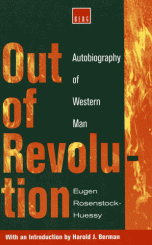Marc Hays: Your Weekly Dose of Rosenstock

I hope the owners of the copyright for Eugen Rosenstock-Huessy’s Out of Revolution don’t mind these regular quotes. If they do, I’ll send them the royalties. Maybe if some you go and buy the book, they’ll consider this an effective advertising campaign and send me a check. Hint, hint.
I’ve had the opportunity to read for several hours today, and I continue to be “blown away” by the narrative of Western Civilization’s Autobiography as told by Rosenstock-Huessy. I’m still working my way through the portion on Lenin and the 1st and 2nd Russian Revolutions. Here’s a gem from today’s reading:
“The materialistic outlook of the Marxists was much truer than they imagined. According to their own theory, changes in economic conditions create new thoughts in men; but in spite of this fact, most of the Russians believed in 1917 that the dream of a world revolution could be realized after a World War. They habitually overlooked the fact that the War itself had created new economic conditions unknown to Marx. The soldiers of the Great War, in their humble and unconscious role as soldiers, made the real revolution. Like Hamlet, they could say to any Marxian dogmatist, “our withers are unwrung.”
When the French bourgeoisie began to take the first steps toward revolt, about 1750, its leaders had in mind specific economic conditions and abuses which were recurrent for the next forty years. The Great War, on the other hand, made a complete change in the economic conditions of the world. Not until the depression of 1929 was the change taken seriously. Prophets, Cassandras, demagogues, had foretold it; but the overwhelming majority of governments and parties had tried to return to the conditions of 1914. These conditions were progress, bigger and better conditions of living, an upward trend for everything, a cheering up from year to year. In so far, the Communists in the Kremlin shared the illusions of the people who held the World Fair of a Century of Progress in Chicago as late as 1933. For had not Socialism and Marxism been born under pre-War conditions? According to the Marxian creed itself, how could a theory be workable after a change in its material government? It was a triumph of Marxism over the Marxists when the Great War, a real and substantial material fact, proved to be of more importance than any volition on the part of parties or individuals. The World War was a World Revolution: it ended Marxism as it ended liberalism.”
You’ll find the book for sale here.<>поиск ключевых словконцепция а интернет-магазина
The post Marc Hays: Your Weekly Dose of Rosenstock appeared first on Kuyperian Commentary.

